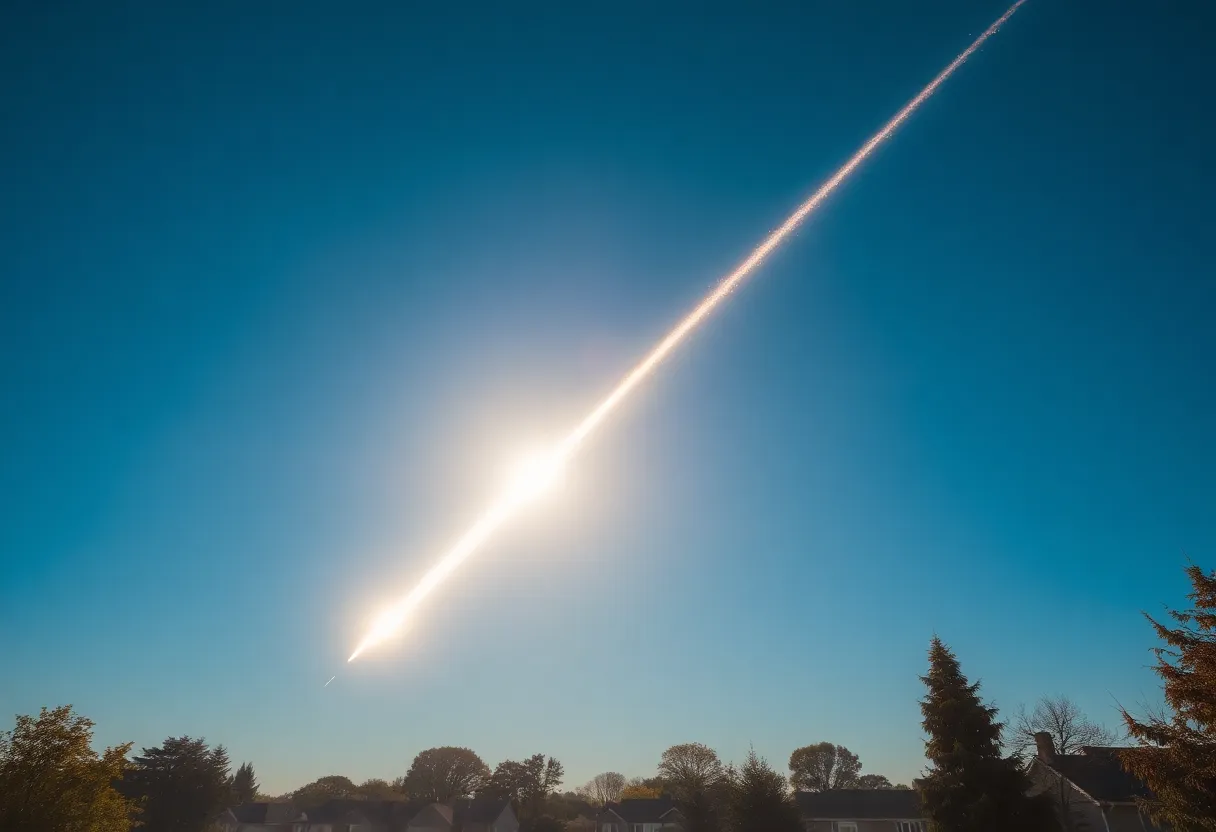News Summary
A bright fireball meteor dazzled residents across Georgia and neighboring states, causing sonic booms and reported structural damage. The National Weather Service attributes the event to the Bootids meteor shower. Eyewitness accounts detail loud booms and shaking homes, particularly in Rockdale County. The meteor, possibly a bolide, was brighter than a full moon, and investigations are underway to identify potential meteorite landing sites.
Georgia experienced a remarkable celestial event on Thursday afternoon, June 26, 2025, as a bright fireball meteor was observed streaking across the sky, resulting in reports of sonic booms and damage in various locations across the Southeastern United States. The fireball was detected between 11:51 a.m. and 11:56 a.m. over the borders of North Carolina and Virginia, and sightings were confirmed by numerous residents throughout metro Atlanta and neighboring states.
The National Weather Service of Charleston, South Carolina, received many reports of the phenomenon, supporting eyewitness testimony about the noise and disturbances it caused. The National Weather Service in Greenville-Spartanburg suggested that based on video evidence, the event was likely a meteorite. They have attributed the occurrence to the ongoing Bootids meteor shower, which was active during that week.
Eyewitnesses described loud booms and reported that their homes shook, with specific accounts highlighting Rockdale County, Georgia as a notable area of impact. More than 100 individual observations were submitted to the American Meteor Society from various states, including Georgia, South Carolina, North Carolina, and Tennessee. The striking visual was captured on dashcam footage, particularly notable in Upstate South Carolina.
Reports of damage emerged from Henry County, Georgia, where a resident experienced a rock crashing through their ceiling, resulting in structural damage. Photographs from the scene displayed a notable hole in the roof and ceiling, with debris scattered throughout the interior. The fireball reached an extraordinary magnitude of approximately -14, making it significantly brighter than a full moon.
Experts have described this event as a daytime fireball, a rare occurrence as these exceptionally bright meteors are seldom observed during daylight hours. A specific subset of fireballs, known as bolides, are noted for their brilliant explosions of light. It is believed that this fireball may have produced a significant explosion upon entering the Earth’s atmosphere.
In the aftermath of the event, the North American Aerospace Defense Command was approached for assistance; however, they referred inquiries to NASA for further information. Satellite imagery indicated the presence of a possible smoke trail stretching from Tennessee and into northern Georgia, reinforcing the widespread nature of the incident.
Emergency management officials in South Carolina were actively monitoring reports as additional details continued to emerge. Though the fireball is part of a relatively minor meteor shower, visibility of such events during daylight makes them even rarer. Furthermore, the sonic boom associated with the fireball was considered an unusual phenomenon, given that sonic booms typically go unheard on the ground during similar occurrences.
As investigations continue, the precise cause of the fireball sightings, as well as the potential landing sites for meteorite fragments, remain unidentified. This mesmerizing event has left residents across the Southeastern U.S. both awestruck and curious, providing a vivid reminder of the dynamic natural phenomena occurring outside of our everyday experience.
Deeper Dive: News & Info About This Topic
- Fox Weather: Daytime Fireball Sighting in Southeast
- CNN: Fireball Spotted Over Southeastern US
- BBC: Video Coverage of Fireball Sighting
- NBC News: Meteor Fireball Over Southeast
- Wikipedia: Meteor
- Google Search: Fireball Meteor 2025
- CBS News: Fireball Meteorite in Georgia
- Encyclopedia Britannica: Meteor
- 11Alive: Reports of Fireball over Atlanta
- Google Scholar: Daytime Fireball Meteor

Author: STAFF HERE CHARLESTON
The CHARLESTON STAFF WRITER represents the experienced team at HEREcharleston.com, your go-to source for actionable local news and information in Charleston, Charleston County, and beyond. Specializing in "news you can use," we cover essential topics like product reviews for personal and business needs, local business directories, politics, real estate trends, neighborhood insights, and state news affecting the area—with deep expertise drawn from years of dedicated reporting and strong community input, including local press releases and business updates. We deliver top reporting on high-value events such as the Spoleto Festival USA, Charleston Wine + Food Festival, and the MOJA Festival. Our coverage extends to key organizations like the Charleston Metro Chamber of Commerce and the Charleston Museum, plus leading businesses in tourism and maritime industries that power the local economy such as South Carolina Ports Authority and the Charleston Visitor Center. As part of the broader HERE network, including HEREaiken.com, HEREbeaufort.com, HEREchapin.com, HEREcharleston.com, HEREclinton.com, HEREcolumbia.com, HEREgeorgetown.com, HEREgreenwood.com, HEREgreenville.com, HEREhiltonhead.com, HEREirmo.com, HEREmyrtlebeach.com, HEREnewberry.com, HERErockhill.com, HEREspartanburg.com, HEREaustin.com, HEREcollegestation.com, HEREdallas.com, HEREhouston.com, and HEREsanantonio.com, we provide comprehensive, credible insights into South Carolina's dynamic landscape.





